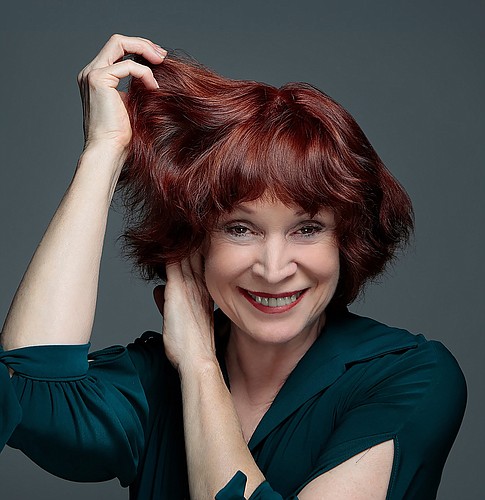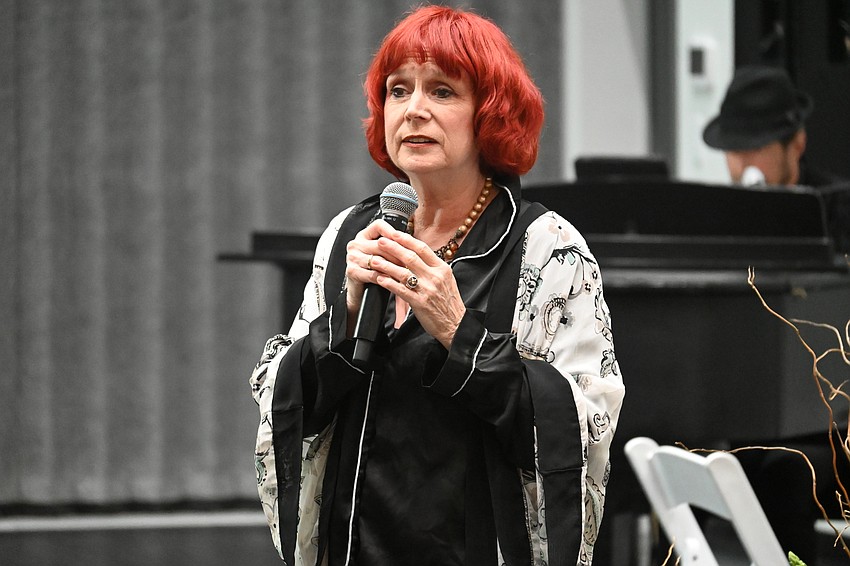- April 28, 2024
-
-
Loading

Loading

Look up the word “multitalented” in the dictionary. There’s probably a picture of Annie Morrison right next to it. She’s an actor, writer, singer, director and a playwright. The list goes on, but you get the idea. This Sarasota-based powerhouse has entertained audiences locally, nationally and globally, in a host of performances, plays and musicals. “Merrily We Roll Along” was one of them.
Morrison was part of the original cast at the Broadway premiere in 1981. Stephen Sondheim and George Furth’s time-bending musical seemed like the perfect equation. (Great source material + great creative minds + great cast = hit.) But it added up to a colossal flop.
That may sound like a depressing story, but it’s not. Flop or not, she had a blast.
Morrison tells her tale and sings a sampling of the musical’s songs in “Merrily from Center Stage,” her original, one-person cabaret show about the musical’s creative gestation.
Morrison’s trippy, time-traveling show is merry indeed. In the following conversation, she set her time machine to 1981 and gave us a taste of the process. And if you’re curious about the musical in the present?
Sondheim's "Merrily" is getting a second chance on Broadway in September with a revival starring Daniel Radcliffe, Jonathan Groff and Lindsay Mendez at the Hudson Theatre following a sold-out run at New York Theatre Workshop.
I do lots of cabaret shows at 54 Below in New York City. About the time when COVID was on the wane, Jennifer Ashley Tepper, their creative and programming director, approached me about doing a musical. She kept hinting that I should do something connected to Stephen Sondheim.
Obviously. (laughs) “The Best Worst Thing That Ever Happened” (about "Merrily We Roll Along") is a treasure. But that documentary ignored the six weeks of rehearsals — and that always fascinated me. My stories about that time all wound up on the cutting room floor. Blake Walton, my creative consultant, suggested that I create my own show and put them back in. I loved that idea! So, the stories I tell in “Merrily from Center Stage” aren’t other people’s stories. I’m not a historian, and I say that in my show. But I am an actor and a storyteller, and I can tell my own stories. And I can share what happened to me during the rehearsals — and how it felt being part of that whole giddy, dizzy process of creative gestation. That’s the premise of my show.
I was the last actor to be cast. The final part of my audition was for Stephen Sondheim on April 9 — which happens to be my birthday. So I guess I got a Broadway show for my birthday!
Absolutely. When a show’s going straight to Broadway, the workshop process takes place during rehearsals. That’s the focus of my show. It’s all about the musical’s creative development, and what it was like to be right in the thick of it.
Well, if you want to find out, the short version is: See my show! For now, let’s say it was just a joy working with two musical theater gods: Stephen Sondheim, the composer and lyricist; and Hal Prince, the director. Yes, we were also working with George Furth, who wrote the book, and Ron Field, the famous choreographer. But the real joy was really working with Hal and Stephen.
You guessed correctly. They were midwifing the show and it was a thrill to be a part of the process — but it was exhausting! The cast gave up all our days off. We’d work five hours a day and then do the latest version that night. So the development period was intense for the whole cast. And we also had a lot of people who’d watch many of those previews. Stephen and Hal were shaping the material right before their eyes! They got a master class in musical theater development.
Exactly! You get that from the documentary; he talks about how he goes into many shows with all the songs already written. In “Merrily,” they weren’t, and he needed more time. That’s why we kept postponing our rehearsals, previews and the opening date. Stephen wanted to get most of the songs done — and he did — before the first preview. I think he was still working on the last part of Lonny Price's “Franklin Shepard, Inc.,” which is a brilliant number. He finished it on the afternoon of first preview!

Basically, he was struggling to find what worked a with a 20-something cast. His lyrics had gotten so complex, and he realized he needed to simplify. He had to find the right voice that felt natural for young performers. And he had to make the time to do it right.
Absolutely! Some people think that “Merrily” has one of their favorite scores because it’s more accessible.
I’d say script problems, which the musical inherited from the original 1933 play. Some critics at the time called it “confusing” and “complicated.” George and Stephen tried to fix it. It was still confusing and complicated … at least to some.
So far, I did it at 54 Below in New York City and freeFall Theatre St. Petersburg when it was a 75-minute show. After that, I took it to The Players in Sarasota, and fleshed it out to a 90-minute show. (They were very helpful to my whole development process.) I performed the longer version at Crazy Coqs in London, and reprised it at freeFall.
No, I think it's pretty much where it needs to be.
Right now, the goal is to take it places like colleges and other theaters. There's also talk of filming it as a special. I originally thought my show at 54 Below was going to be a one-night-only thing. I had no idea it was going to take off!